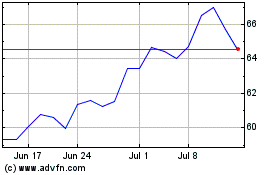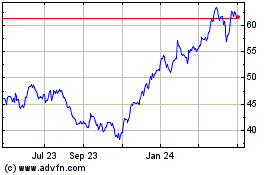Tax Cut Would Cost BofA, Citi Billions, but They Will Still Win -- Update
April 26 2017 - 2:33PM
Dow Jones News
By Michael Rapoport and Telis Demos
A cut in the corporate tax rate would involve immediate pain for
some big banks, namely Citigroup Inc. and Bank of America Corp.,
but an eventual earnings boost should more than make up for
that.
A corporate tax cut from the current 35% to 15%, which the White
House proposed Wednesday, would lower companies' tax bills and
fatten their bottom lines. Banks like Citigroup and Bank of America
would have to take some sour with the sweet: A lower tax rate would
mean they will have to take billions of dollars in charges against
earnings to write down the value of their giant piles of "deferred
tax assets."
These assets consist of tax credits or deductions that typically
spawned from big losses, like those the banks experienced during
the financial crisis. They are essentially IOUs the banks can use
to defray future tax bills.
If those tax bills are reduced in the future by a rate cut, the
deferred tax assets would be worth less. That could lead Citigroup
to write down their value by anywhere from $6 billion to $12
billion, based on some figures the bank has provided and analysts'
calculations and depending on the ultimate contours of a tax-rate
overhaul. Bank of America's hit could be around $4 billion.
Citigroup had $46.7 billion of net deferred tax assets as of the
end of 2016, while Bank of America had $19.2 billion.
The hit to earnings would be a one-time event, though. The
offset is that the banks "are going to make more money for life,"
said John McDonald, a bank analyst at Sanford C. Bernstein. "What
the market does care about is earnings and their earnings would be
permanently improved."
In fact, the gain to the banks' bottom lines from lower tax
rates means they could potentially recoup the value of the
write-downs in a year or two.
The banks "should be willing to make the trade off," said
Michelle Hanlon, an accounting professor at the Massachusetts
Institute of Technology's Sloan School of Management.
What's more, deferred tax assets are complex and it will take
time to gauge just how much of a write-down banks will have to
take.
Much of Citigroup's net deferred tax assets, for example,
consist of state or foreign deductions and credits or other assets
that wouldn't be affected by a cut in the U.S. federal tax rate.
John Gerspach, the bank's chief financial officer, told analysts
last November that a drop to a 25% corporate tax rate could
translate into a charge of roughly $6 billion.
A reduction in the rate to 15% could raise the write-down to $10
billion, Bernstein analysts estimated.
Changes to the overall system for levying corporate taxes could
also have an impact. Currently, the U.S. taxes corporate profits no
matter where in the world they are earned. But there is debate
about shifting the system to a so-called territorial one, where
taxes are only levied on profits generated in the U.S.
Citigroup's Mr. Gerspach has said that a move to such a system,
coupled with a reduction in the tax rate to 25%, could lead the
bank to take a $12 billion write-down.
The magnitude of a write-down could also depend in part on how
quickly a tax-rate reduction is put into effect. "There's a lot of
moving pieces," Mr. Gerspach said, adding that to the extent the
tax rate is reduced over time, a write-down "would likely be
lower."
At Bank of America, only about $7 billion of the firm's net
deferred tax assets is in the U.S. and subject to revaluation. That
would lead to a write-down of around $4 billion if the tax rate is
lowered to 15%, a person familiar with the situation said.
Such write-downs wouldn't only affect profits. They would also
cut into a bank's book value, or net worth. Some measures of a
bank's regulatory capital could also be affected, though the impact
there would be limited because only a slice of the tax assets can
be counted toward regulatory capital to begin with.
And any reduction could be made back fairly quickly. Based on
Bank of America's 2016 net income and effective tax rate, the firm
would likely recoup nearly all of its write-down within a year
through higher net income.
At Citigroup, Chief Executive Michael Corbat said on a
conference call in January that while corporate tax reform could
lead to a tax-asset write-down, it would "result in higher net
income and improved returns."
Bernstein estimated Citigroup's 2018 earnings per share could
jump by 84 cents with a 15% tax rate, and its return on tangible
common equity could rise to 9.9%.
An added bonus: investors for years have questioned the value of
the deferred tax assets, which has weighed on the stock's
valuation. "They're not getting a lot of credit in the stock price
for their DTA," Mr. McDonald said. So, a reduction in the tax rate
would lift that uncertainty.
Write to Michael Rapoport at Michael.Rapoport@wsj.com and Telis
Demos at telis.demos@wsj.com
(END) Dow Jones Newswires
April 26, 2017 14:18 ET (18:18 GMT)
Copyright (c) 2017 Dow Jones & Company, Inc.
Citigroup (NYSE:C)
Historical Stock Chart
From Mar 2024 to Apr 2024

Citigroup (NYSE:C)
Historical Stock Chart
From Apr 2023 to Apr 2024
